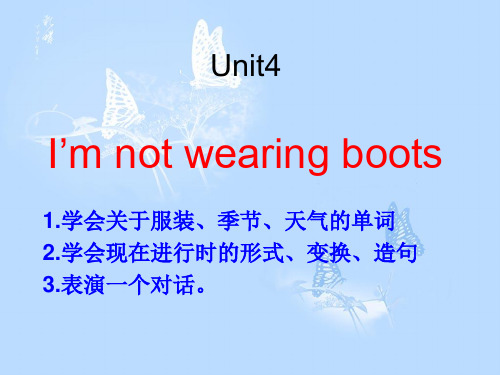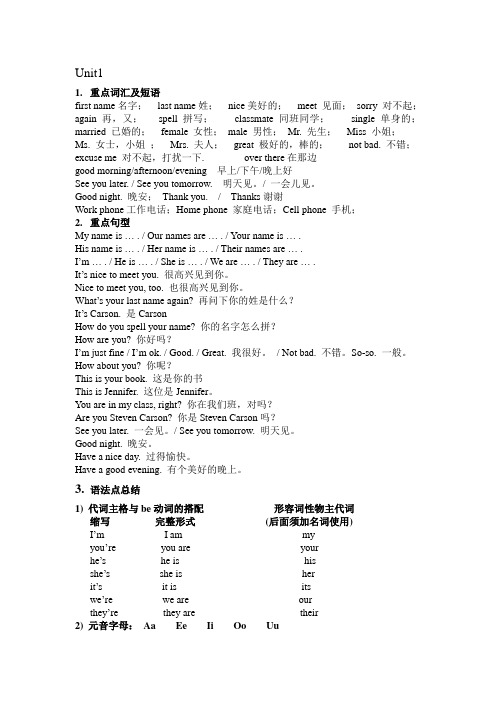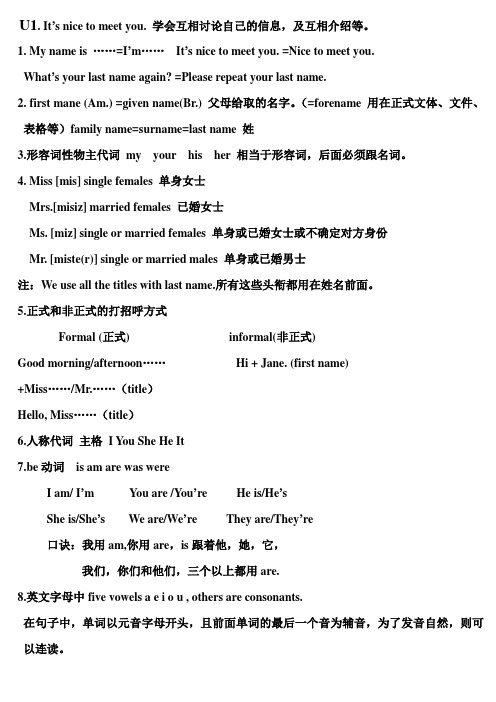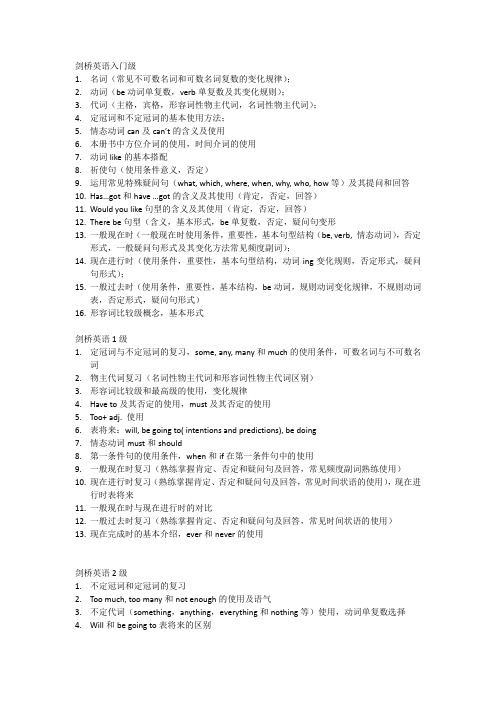剑桥国际英语教程(入门级)知识总结
剑桥国际英语教程 入门级 单元 全

-----的
• 表示拥有权。一般在人或者其他名词后直 接加’s
• 例如:Tom’s 汤姆的 Class three’s 三班的 • That’s Tom’s watch=That watch is Tom’s
对话
• great! (口语)太棒了。 • clothes are dry.我的衣服干了。 衣服一般为复数名词,所以用are. what color is it? it’s white. 它是什么颜色?白色 is it yours? 这是你的吗? No, it’s not mine.这不是我的 Here’s the problem.问题出在这。 whose jeans are they?这是谁的牛仔裤?
P:
. It’s these new blue jeans.
Whose jeans are they?
J: Uh,
. Sorry.
• dry • wet • yours • mine • hers • whose
其他
• 干的 • 湿的 • 你的 • 我的 • 她的 • 谁的
重点单词
• ask vt. 问,询问;要求 ;邀请
• I asked her but she didn‘t answer. 我问她但她不回答。
• It‘s asking for trouble. 这是自找苦吃。
P: ! Our clothes dry. Where is my
new blouse?
J:
?
P: it’s white.
J: Here’s a light blue blouse.
?
P: No, it’s not mine---Wait. It is mine. !
剑桥国际英语教程入门级unit1-2重点

1.重点词汇及短语first name名字;last name姓;nice美好的;meet 见面;sorry 对不起;again 再,又;spell 拼写;classmate同班同学;single 单身的;married 已婚的;female 女性;male 男性;Mr. 先生;Miss 小姐;Ms. 女士,小姐;Mrs. 夫人;great 极好的,棒的;not bad. 不错;excuse me 对不起,打扰一下. over there在那边good morning/afternoon/evening 早上/下午/晚上好See you later. / See you tomorrow. 明天见。
/ 一会儿见。
Good night. 晚安;Thank you. / Thanks谢谢Work phone工作电话;Home phone 家庭电话;Cell phone 手机;2.重点句型My name is … . / Our names are … . / Your name is … .His name is … . / Her name is … . / Their names are … .I’m … . / He is … . / She is … . / We are … . / They are … .It’s nice to meet you. 很高兴见到你。
Nice to meet you, too. 也很高兴见到你。
What’s your last name again? 再问下你的姓是什么?It’s Carson. 是CarsonHow do you spell your name? 你的名字怎么拼?How are you? 你好吗?I’m just fine / I’m ok. / Good. / Great. 我很好。
/ Not bad. 不错。
So-so. 一般。
How about you? 你呢?This is your book. 这是你的书This is Jennifer. 这位是Jennifer。
剑桥国际英语入门级

Where is /are....?
4
What's this called in English?
5
Are these.....?
1
What's this?
2
What are these?
3
What are these called in English?
why's james having lunch?
key sentences
Grammar - tell the time
整点--- 数字+o'clock
00
one o'clock
00
ten o'clcok
非整点
直接按顺序读数字 时+分
13
eight thirteen
04
nine zero four
you are not early.
it's not book.
she 's not lucy.
I'm not from.....
expand-age
How old are you?
How old is she/he?
How old are they?
3
i'm 19. i'm nineteen.
time-非整点
不超过(包括)半小时
分+past+时
05
five past nine
12
twelve past ten
超过半小时
与下一个整点相隔的分钟+to+(时+1)
剑桥国际英语入门级U1单元总结

U1.It’s nice to meet you. 学会互相讨论自己的信息,及互相介绍等。
1. My name is ……=I’m……It’s nice to meet you. =Nice to meet you.What’s your last name again? =Please repeat your last name.2. first mane (Am.) =given name(Br.) 父母给取的名字。
(=forename 用在正式文体、文件、表格等)family name=surname=last name 姓3.形容词性物主代词my your his her 相当于形容词,后面必须跟名词。
4. Miss [mis] single females 单身女士Mrs.[misiz] married females 已婚女士Ms. [miz] single or married females 单身或已婚女士或不确定对方身份Mr. [miste(r)] single or married males 单身或已婚男士注:We use all the titles with last name.所有这些头衔都用在姓名前面。
5.正式和非正式的打招呼方式Formal (正式) informal(非正式)Good morning/afternoon……Hi + Jane. (first name)+Miss……/Mr.……(title)Hello, Miss……(title)6.人称代词主格I You She He It7.be动词is am are was wereI am/ I’m You are /Y ou’re He is/He’sShe is/She’s We are/We’re They are/They’re口诀:我用am,你用are,is跟着他,她,它,我们,你们和他们,三个以上都用are.8.英文字母中five vowels a e i o u , others are consonants.在句子中,单词以元音字母开头,且前面单词的最后一个音为辅音,为了发音自然,则可以连读。
剑桥入门级至四级语法

剑桥英语入门级1.名词(常见不可数名词和可数名词复数的变化规律);2.动词(be动词单复数,verb单复数及其变化规则);3.代词(主格,宾格,形容词性物主代词,名词性物主代词);4.定冠词和不定冠词的基本使用方法;5.情态动词can及can’t的含义及使用6.本册书中方位介词的使用,时间介词的使用7.动词like的基本搭配8.祈使句(使用条件意义,否定)9.运用常见特殊疑问句(what, which, where, when, why, who, how等)及其提问和回答10.Has…got和have …got的含义及其使用(肯定,否定,回答)11.Would you like句型的含义及其使用(肯定,否定,回答)12.There be句型(含义,基本形式,be单复数,否定,疑问句变形13.一般现在时(一般现在时使用条件,重要性,基本句型结构(be, verb,情态动词),否定形式,一般疑问句形式及其变化方法常见频度副词);14.现在进行时(使用条件,重要性,基本句型结构,动词ing变化规则,否定形式,疑问句形式);15.一般过去时(使用条件,重要性,基本结构,be动词,规则动词变化规律,不规则动词表,否定形式,疑问句形式)16.形容词比较级概念,基本形式剑桥英语1级1.定冠词与不定冠词的复习,some, any, many和much的使用条件,可数名词与不可数名词2.物主代词复习(名词性物主代词和形容词性物主代词区别)3.形容词比较级和最高级的使用,变化规律4.Have to及其否定的使用,must及其否定的使用5.Too+ adj. 使用6.表将来:will, be going to( intentions and predictions), be doing7.情态动词must和should8.第一条件句的使用条件,when和if在第一条件句中的使用9.一般现在时复习(熟练掌握肯定、否定和疑问句及回答,常见频度副词熟练使用)10.现在进行时复习(熟练掌握肯定、否定和疑问句及回答,常见时间状语的使用),现在进行时表将来11.一般现在时与现在进行时的对比12.一般过去时复习(熟练掌握肯定、否定和疑问句及回答,常见时间状语的使用)13.现在完成时的基本介绍,ever和never的使用剑桥英语2级1.不定冠词和定冠词的复习2.Too much, too many和not enough的使用及语气3.不定代词(something,anything,everything和nothing等)使用,动词单复数选择4.Will和be going to表将来的区别5.When和while在引导时间状语从句时的异同6.Must和have to及其否定间的区别7.可能性:情态动词will和may/ might的比较(含否定)8.形容词和副词的比较级和最高级变化规则复习,可修饰的频度副词9.后加ing动词和to do动词的总结10.反义疑问句含义,变化形式11.直接引语和间接引语(概念介绍,转换时时态的变化)12.定语从句的基本介绍(定语,先行词,关系词,作用)13.第一条件句中unless的使用,与if的转换;14.第二条件句(含义,基本形式,与第一条件句的对比)15.一般现在时,现在进行时,一般过去时复习和对比(句型形式,使用条件,变化形式,动词变化规律,特殊使用情况)16.一般现在时被动(基本形式,否定形式,疑问句形式)17.现在完成时使用条件复习,just/ already/ still/ yet的使用及语气,for和since的使用区别18.现在完成进行时(基本形式,重要性,否定,疑问句及其回答)19.现在完成时和现在完成进行时的对比20.过去完成时基本介绍(基本句型结构,使用条件,否定,疑问句,与一般现在时的对比及联系)剑桥英语3级1.时态复习(一般现在时,现在进行时,一般过去时,过去进行时,一般将来时,现在完成时)和对比(一般过去时和现在完成时,现在完成时和现在完成进行时,一般过去时和过去完成时)2.常见时间连词的使用ed to和be used to使用方法及区别4.Had better/ should/ ought to的使用和区别5.使役动词have和make6.Make/ let/ be allowed to的使用及其区别7.后加ing动词和to do动词的复习与补充8.常见表obligation, prohibition, permission情态动词的总结9.表对比连接词的使用10.在一般现在时中表推断的情态动词11.在一般过去时中表推断的情态动词12.直接引语和间接引语复习(形式,转换时时态的变化规则)13.第一条件句与第二条件句的复习(形式,语气对比),补充wish和if only在虚拟语气中的应用14.第三条件句(基本形式,语气,与一二条件句的对比)15.虚拟语气总结(if,wish,if only等)和补充(常见动及名词等)16.被动(一般现在时,一般过去时,一般将来时,现在完成时等时态中的具体形式,被动句的使用原因等)17.定语从句(复习与补充,如:关系副词,that与which区别,关系代词和关系副词的转换等)与非限定性定语从句(形式,与限定性的区别,as和which等)18.名词性从句的基本介绍(主语从句,表语从句,宾语从句,同位语从句)剑桥英语4级1.时态复习(过去,现在,将来等),2.被动复习(过去,现在,将来等),补充进行时中的被动,过去完成时和过去完成进行时的被动3.定语从句和非限定性定语从句4.直接引语和间接引语复习5.后加ing动词和to do动词的复习和补充6.反义疑问句复习7.Need用法(情态动词,实义动词)8.What引导的名词性从句9.倒装10.间接疑问句和直接疑问句(语序,时态转换等)11.情态动词用法总结(基本用法(能力,许可,命令,义务等),表推测(对过去和现在的推测),表责备,表委婉等)12.第一至三条件句复习,混合条件句,零条件句的讲解(重要性,含义,基本形式,与其他条件句的区分)13.将来完成时和将来进行时的讲解(基本形式,使用条件,变形)14.定语从句中关系词的省略15.分词短语在句中的位置,与从句的转换16.状语从句(原因状语,地点状语,时间状语,目的状语及其常见连接词)17.Passive report structure。
剑桥国际英语教程(入门级)7单元(全)

对话
• • • • Does it have a yard? 有院子吗 That sounds nice.听起来太棒了。 live alone.一个人住。 Do you have any sisters or brothers? 你有 兄弟姐妹吗? • that’s a big family.那是一个大家庭。 • own 自己的 my own bedroom.
口语基础E班 29-30教案 时间:11月8日19:10~21:00 授课老师:刘向
Unit 7 Does it have a view
1.学会常见房间设置以及家具的表达 2.使用There be 句型。
复习房间设置
• • • • • • • • 1.dining room 2.kitchen 3.living room undry room 5.bed room 6.bathroom 7.yard 8.hall • • • • • • • • 餐厅 厨房 起居室 洗衣间 卧室 浴室 院子 大厅
• 讲解Part7练习 • 讲解Part9练• there be 句型,“有”,表示“某时某地有某物”,它表 示客观存在,have,“有”,更加表示某人“拥有”的 意思。一定程度上,两者可以互相转换。P47 • there be 句型是日常生活中最常用的句型之一。它的句 型转换符合Be动词的所有规律。 • there is (not) =there are (not) • there is no +单数,表示否定,没有--• there are no +复数,表示否定,没有--• There’s no sofa in the bedroom.卧室里没有沙发 • There are no chairs in the living room.客厅里没有椅子
剑桥国际英语教程入门级15单元

Vocabulary:
• 1. grow up: spend the years between being a child and being an adult. • 2. college: university • 3. major: main subject someone studies • 4. drama: acting
表示过去的时间状语
• two hours ago, yesterday, the day before yesterday, last week, last (year, night, month…) • just now, one day, long ago, once upon a time(很久以前)
Unit 15 Where were you born?
1.一般过去时的BE动词变化; 2.一般过去时的特殊疑问句。
• 一般过去时(simple past tense)表示过去某 个时间里发生的动作或状态 . • 1. 主谓宾结构 • I watched TV yesterday. • 2.主系表结构 • I was a teacher 3 years ago.
Wh-question with the past of be
• 1.Wh-word + did + subject + verb (+ complement) ? • When did you come to Los Angeles?
• 2. Wh-word + was / were + subject (+complement)? • What was your major in college?
Statement with the past of be
剑桥国际英语教程(入门级)11单元

January February March April May June July August September October November December
Jan. Feb. Mar. Apr. May. June. July. Aug. Sept. Oct. Nov. Dec.
Let’s talk
Listening and snapshot
New Year’s Day 新年 Valentine’s Day 情人节 Independence Day 独立日 Halloween 万圣节 Thanksgiving Day 感恩节 Christmas 情人节 Teachers’ Day 教师节 National Day 国庆节 Children‘s Day 儿童节 Tree-planting Day 植树节 Army Day 建军节
• • • • •
特殊疑问句=特殊疑问词+一般疑问句 What are you going to do? Where are you going? How are you going there? Who is going to be there?
一般将来时常与以下短语连用
am not going to do are going to have are is going to be is going to have going to start
be going to
• be going to 是一种固定结构,它后面要接动词原形, 用来表示按计划或安排要发生的动作,有时也可以表 示推测将要发生的动作,有“准备;打算”的意思。 • be going to 符合be动词的所有用法。 • We are going to have a class meeting this afternoon. 今天下午我们打算开班会。(安排) • Look at the black clouds. It's going to rain. 看那些乌云,快要下雨了。(推测)
- 1、下载文档前请自行甄别文档内容的完整性,平台不提供额外的编辑、内容补充、找答案等附加服务。
- 2、"仅部分预览"的文档,不可在线预览部分如存在完整性等问题,可反馈申请退款(可完整预览的文档不适用该条件!)。
- 3、如文档侵犯您的权益,请联系客服反馈,我们会尽快为您处理(人工客服工作时间:9:00-18:30)。
It’s a camera.
What’s this called in English
Whereare my keys
Is this your wallet
a/an
plural –s
yes/no & where questions withbe
in, in front of, behind, on, next to, under
Daily/weeklyroutines/schedule
I drive to work.
I go to work by car.
My parents work downtown.
He walks to work.
She rides her bike to school.
What time do you get up on Sundays
Myname is Lee.
Good morning.
How are you
Have a nice day!
My, your, his, her
Am, is, are
Unit 2
What’s this
Objects
in your bag;
in your classroom;
in a room
What’s this
Simple present questions:
Do/does
Wh-
Unit 7
Does it have a view
Rooms in a house/an apartment
Furniture
I live in an apartment/a house.
Does Less live in a house
Countable & uncountable nouns
always, usually, often,
sometimes, hardly ever, never
Unit 10
I can’t ice-skate very well.
Sports
Abilities & talents
Ride a horse, paint pictures, play the violin, design a webpage
I can’t play the piano very well.
Simple present Wh-questions
what, who, where, how often, when, what time
Can
Unit 11
What are you going to do
Months and dates
How old were you then
What was your major in college
How was college
一般过去时
Statements with the past ofbe
Questions with the past ofbe
Wh-questions with did, was, and were
A doctor has a stressful job.
Unit 9
Broccoli is good for you.
Foods:
grains, fruit & vegetables, meat and other protein, dairy, fat, oil and sugar
What do you want for the picnic
What’s your plan
Doyou have any plans for this Sunday
Be going to一般将来时
Unit 12
What’s the matter
Parts of the body
Symptoms
How are you
How do you feel
What’s wrong/the matter
Do/does
Yes, I do.
No, it doesn’t.
There is/are
Unit 8
What do you do
Jobs & workplaces
Adjectives to describe a job
What do you do
Where does he work
He works in a hospital.
How about some sandwiches
We have some apples.
We don't have any apples.
Let’s get some apples.
I always eat breakfast.
What do you have for lunch
Some and any;
Does your house have a yard
It’s on Lakeview Drive.
There is a sofa in the living room.
There aren’t any chairs in the kitchen.
Simple present short answers
What are you doing
I am cooking.
What is he doing
Time
Present continuous Wh-questions
现在进行时
Unit6
My sister works downtown.
Family members & relatives
Ways to go somewhere
Are you from Italy
I am from China.
Who is that
What's he like
What
Where
How
Who
How old
Unit 4
I’m not wearing boots!
Clothes
Colors
Weather
seasons
I am wearing a black coat today.
Feel+ adjectives (sick, terrible, homesick)
Imperatives
Unit 13
You can’t miss it.
Places & things
. drugstore - aspirin
You father is going to the drugstore.
Is there a public restroom near here
Excuse me. Can you help me
How can/do I get to City Library
Can you show me the way to this place
It's across from the bus station.
Plans & activities for special occasions
Holidays & festivals
What are you going to do this Sunday
Is she going to order you a cake
We are going to play tennis.
What do you do in your spare time
What sports do you play/like to watch
Who do you play tennis with
How often do you play basketball
What time do you start
Classes:
history, Chinese, Science
Schools:
elementary, junior high, high, college
Places:
gym, lunchroom, playground, classroom
Where were you born
I was born in China.
Interchange Intro
Vocabulary
Expressions
Grammar
Unit 1
It’s nice to meet you.
Zero, one, two, three, four, five, six, seven, eight, nine, ten
What’s your name
What color is your coat
Whose jeans are these
Are these shoes yours
It’s raining/rainy.
My, your, his, her, our, their
Mine, yours, his, hers, ours, theirs
It’s on the right/left
Unit 14
Did you have fun
Activities: do laundry, exercise, clean, shop, visit friends, stay home, read books
Summer activities: go hiking, have a picnic, play tennis, see a movie, take a class
How do you like it
